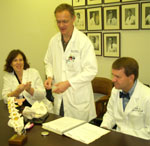MUSC opens multidisciplinary clinic
for incontinence
by Mary
Helen YarboroughPublic Relations
A new multidisciplinary clinic that opened at MUSC enables sufferers of pelvic floor disorders—both men and women—to be treated at one place for various causes of incontinence.
 MUSC pelvic floor
clinicians discuss incontinence. The clinic is said to be the first
multidisciplinary pelvic floor clinic in the Southeast. From left are
advance practice registered nurse Lynette Franklin, Dr. Ross Rames and
Dr. Steve Swift.
MUSC pelvic floor
clinicians discuss incontinence. The clinic is said to be the first
multidisciplinary pelvic floor clinic in the Southeast. From left are
advance practice registered nurse Lynette Franklin, Dr. Ross Rames and
Dr. Steve Swift.The MUSC Bladder and Pelvic Health Center (BaPH) will serve both men and women of all ages that suffer from incontinence, both bowel and urinary. The clinic is staffed by urologists, urogynecologists, nurses, and soon will include a digestive disease specialist (likely a colorectal surgeon) and pelvic physical rehab services. Next year, the center hopes to add a fellow whose expertise combines urology and OB/GYN.
“There is a big overlap between OB/GYN and urology,” said Ross Rames, M.D., a BaPH urologist. “Before this clinic, men would have to go to a urologist and women would go to an OB/GYN and a urologist. Instead of duplicating services, we felt it was wiser to having the services together in one center.”
The clinic also has eliminated the competition that exists between professionals that treat the disorders. “Twenty percent of the diseases go hand-in-hand, said Rames. “Typically, when specialists get together, it results in a clash of opinions,” and patient care can suffer."
“The service was driven by patient care and economics,” said Steven Swift, M.D., a BaPH urogynocologist. “As expenses go up, the cost of referrals is explosive for both the patient and the provider. So, it just made sense to bring these services together.”
Urinary incontinence is a condition affecting 16 million Americans. Roughly 1.6 million suffer from bowel incontinence. Both of these conditions are pelvic floor disorders. Aside from the psychological effects of such conditions, treatment, which often involves referrals to various specialists, can be exhausting and costly.
BaPH was formed as a multidisci-plinary collaborative effort, led by renowned urologist Eric S. Rover, M.D., and is the first of its kind in the southeastern United States. Cutting down on multiple referrals, it offers a seamless, efficient, cost-effective and comprehensive evaluation and treatment center for both men and women.
BaPh offers advanced non-surgical therapies for even the most complex pelvic floor problems that include access to clinical trials of new medicines and treatments.
Current clinical trials include those related to stress incontinence, urge incontinence, urogenitalatrophy, and obesity and incontinence.
The center also offers treatment for pre-op and post-op for colostomy patients. “Medical management and behavioral care are a big part of the center’s focus,” said Lynette Franklin, a board certified advanced practice registered nurse and BaPH team member. As a result, the clinic also offers biofeedback to improve patient success in overcoming incontinence. Franklin credited a better educated patient population for requiring the new service.
“You have patients talking to physicians and they are seeking more advanced health care,” Franklin said. “Today, advertising has made more people aware and open, so the embarrassment factor over incontinence is not as great as it once was.”
About the practitioners:
- Eric S. Rovner, M.D., is the director of the section of voiding dysfunction, female urology and urodynamics in the Department of Urology at MUSC. This is Rovner’s second involvement with a multidisciplinary urogynecological treatment center. He is a board-certified member of the American Urological Association, Fellow of the American College of Surgeons, as well as a member of the American Urogynecologic Society.
- Ross Rames, M.D., is an associate professor at MUSC with a special interest in both male and female voiding dysfunction and incontinence, as well as pelvic prolapse, fistulas and strictures. He is board certified in urology and a fellow of the American College of Surgeons. He is considered an expert in sacral neuromodula-tion, or interstim, treatments.
- Steven Swift, M.D., is an associate professor in the department of obstetrics and gynecology. Swift’s practice focuses on patients with urinary, fecal incontinence and pelvic organ prolapse. A board-certified member of the American College of Obstetricians and Gynecologists, and a member of the American Urogynecologic Society, Swift has repeatedly been named to “Best Doctors in America.”
- Lynette Franklin, R.N., is a clinical nurse specialist with training in wound, ostomy and continence nursing. She received her bachelor’s of nursing science from Queen’s University in Kingston, Canada, and completed her master’s of nursing at the Medical University of South Carolina (MUSC). She attended Emory University in Atlanta to receive her WOC specialty training.
—Tim Gehret contributed to this report
Friday, Sept. 8, 2006
Catalyst Online is published weekly,
updated
as needed and improved from time to time by the MUSC Office of Public
Relations
for the faculty, employees and students of the Medical University of
South
Carolina. Catalyst Online editor, Kim Draughn, can be reached at
792-4107
or by email, catalyst@musc.edu. Editorial copy can be submitted to
Catalyst
Online and to The Catalyst in print by fax, 792-6723, or by email to
catalyst@musc.edu. To place an ad in The Catalyst hardcopy, call Island
Publications at 849-1778, ext. 201.